
| By AUNG ZAW | SEPTEMBER, 2005 - VOLUME 13 NO.9 |
Burma’s business czars tread a wary path
In today’s
The rulers of
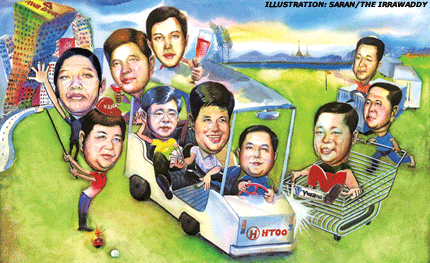
The second group is the tycoons who grow rich in their impoverished country. Since the regime introduced an “open market economy” in 1989 and abandoned the “
Entrepreneurs opened business offices and set up companies overnight as they became self-appointed CEOs or managing directors in newly-established companies. Chauffeured in their powerful SUVs and sleek Mercedes Benz limousines, they travel far, locally and internationally, to conduct business and find new markets. Their business interests cover export-import, construction, agriculture, transportation and communications, mining, hotels and tourism, and the garment trade.
But the new entrepreneurs cannot succeed alone; they need partners and influential friends in order to flourish. Rule number one is to have friends in high places. Entrepreneurs need the blessing of the generals in order to conduct successful businesses. Not surprisingly, many businessmen have forged friendly ties with top military leaders, recognizing that the military is in virtual control of all aspects of the business sector. For example, the Union of Myanmar Economic Holdings (UMEH) and the Myanmar Economic Corporation (MEC) are the two Major industrial conglomerates controlled by the military dominating many of the key economic sectors of the country. Local businessmen and entrepreneurs flaunt their powerful connections by appearing on state-run TV and in newspapers rubbing shoulders with the generals at state functions, ribbon-cutting ceremonies and charity events.
The fact is that business and politics are inseparable in
There are both advantages and disadvantages in this relationship. Many tycoons find themselves blacklisted by the
The secretive and corrupt business environment in
Bribery and corruption are thus rampant. Many businessmen are seen as government cronies and in some cases have become pawns in power struggles between the generals.
Last year, shortly after the removal from power of military intelligence chief and prime minister Gen Khin Nyunt, many prominent businessmen were summoned by a group of coup survivors—Gen Thura Shwe Mann, newly appointed prime minister Gen Soe Win and Lt-Gen Thein Sein, Secretary One of the ruling council—and were urged to co-operate with the government. The bewildered businessmen were told that many cases of bribery and corruption had been uncovered in Gen Khin Nyunt’s departments. Honesty and the adoption of world standards of business behavior were now required, the bemused businessmen were told.
Prime Minister Gen Soe Win told them: “We wish to urge the entrepreneurs, who are responsible for systematic formation of the market economic system, to conduct their business peacefully and honestly, while equally considering the future of the state and of the people, in accordance with the laws and regulations.”
The assembled entrepreneurs were given a detailed description of the reasons for the October coup against Khin Nyunt. They were told that Khin Nyunt’s department and its staff members had been creaming large profits from business and border trade. Khin Nyunt had been told to stop the profiteering but had ignored the order, and he had had to go, together with more than 300 officers and high ranking officials. The National Investigation Bureau and military intelligence service were abolished and Khin Nyunt and his family put under house arrest. Many businessmen with strong ties to Gen Khin Nyunt were investigated.
In his speech to the entrepreneurs, Gen Soe Win said: “Bribing and corrupting with unscrupulous staff [and] having relations on [a] personal basis will not be beneficial in any way and will be seen and blamed by the people as plans designed to create a new class that benefits a group or a minority of the people. The government will, without discrimination, protect the interests of the majority of the people in accordance with the policy, rules and regulations instead of protecting personal interests.”
At the same meeting, Gen Thura Shwe Mann repeatedly warned businessmen to disclose information on how donations are made. Reports would have to be submitted to new intelligence chief Maj-Gen Myint Swe, he said, warning that those who neglected to do this would be held responsible.
Khin Nyunt’s downfall shook the Burmese business community to its roots, and many who had had close contacts with the disgraced prime minister adopted a very low profile indeed. But did Khin Nyunt’s removal and the regime’s call for the adoption of a new honesty clean up the business scene? The answer has to be a resounding No.
Businessmen who had (wisely, as it turned out) forged special relationships with the surviving and still powerful generals carried on business as usual, and they prospered.
The appeals by Shwe Mann and Soe Win for business honesty and an adherence to legal practices have had no effect—cronyism, nepotism, corruption and bribery continue to rule in everyday business life in
Yet business in
The tycoon lurching in his limousine along
 Tay
Tay
As president and managing director of the Htoo Trading Company, 41-year-old Tay Za is a major player in a wide area of Burmese business and industrial activities, ranging from tourism and the hotel trade to arms imports.
In 1990, while still in his twenties, Tay Za set up his company with an initial capital investment of US $333,333, concentrating on the export of timber and over the years gaining access to large areas of virgin forest. Ironically, one of his most recent ambitions is to diversify into eco-tourism.
One of his early ventures was the foundation of Htoo Transportation Services, covering heavy duty land and marine transport. Much later, he took to the air, establishing the domestic carrier Bagan Air.
Rumors that Htoo had entered the telecommunications sector and planned to sell GSM cell phones were denied by the company. Other rumors say the young tycoon is preparing to break into banking.
Timber, transport, tourism, construction, property development, palm oil production, arms deals—the list of the Htoo Trading Company’s interests grew impressively, and so did the company’s earnings, which finance a tycoon’s lifestyle and give him easy access to the top echelons of power. Along the way, he worked with, and then parted company from, the well-known businessman Aung Ko Win.
Three years into the life of the Htoo Trading Company, Tay Za expanded his dealings with the
Despite the presence of Russian arms dealers in
Tay Za’s close connection to the regime is undoubtedly one of the keys to his success. Ties to the top are vitally important when doing business in
Yet courting the children of powerful generals in order to take them on board his company appears to be one of Tay Za’s business strategies. An important coup was to seal a friendship with Aung Thet Mann, son of the junta’s number three, Gen Thura Shwe Mann, who is tipped to take over the leadership when Than Shwe goes.
Aung Thet Mann’s company, Ayer Shwe Wah, is now part of Htoo, and the general’s son is reaping big cash rewards from the arrangement. When the regime relaxed its ban on rice exports, Aung Thet Mann’s company was awarded the first rice export licence, providing for the delivery of 11,000 tons to
Business rivals accuse Aung Thet Mann of winning contracts for construction works in the project to move the War Office to Pyinmana because of his access to government supplies of cheap cement, enabling him to submit the lowest tenders.
It’s not all plain sailing for the two pals, however—diplomatic sources say that their plans to visit tourist resorts in
Protectively, perhaps, Tay Za appears to be hedging his bets on the future, like any clever businessman, by adding Kyaing San Shwe, Than Shwe’ s son, to his coterie of friends. He sealed his new friendship by buying Kyaing San Shwe an American-made Hummer, the civilian version of the military Humvee that is the latest status symbol on American highways and which now turns heads on
..........................................................................................................
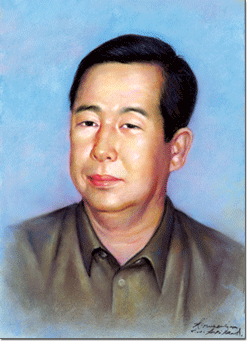 Tun Myint Naing
Tun Myint Naing
Tun Myint Naing, or Steven Law—as he likes to be known—is managing director of Asia World Co, Burma’s biggest conglomerate, but he is probably better known as the son of the 1970s drug lord and militia leader Lo Hsing Han.
Lo is chairman of Asia World, and its guiding force, leaving his son with a hard task of maintaining the company’s reputation and credibility.
Saddled with this family background, Law keeps a low profile and rarely speaks to the international press. Although he travels extensively within Asia, he is banned from entering the
The
The militia raised by Lo—an ethnic Chinese from the Kokang region of Burma’s section of the opium-producing Golden Triangle—was co-opted by the Rangoon regime to join in the fight against the Communist Party of Burma. But Lo fell foul of the regime, and in 1973 he was put on trial for treason and sentenced to death. Seven years later he was amnestied and returned to the Kokang region.
In subsequent years he developed close relations with the former prime minister Khin Nyunt and his regime, helping to seal ceasefire agreements with Wa and Kokang forces in the early 1990s. Khin Nyunt’s downfall last October doesn’t appear to have had any negative effects on the close relations between the Lo family and the
Asia World Co was founded on June 5, 1992, with strong financial backing and on a broad platform of business activities. Its many construction projects include road building in
Transport and communications also figure in Asia World’s wide range of activities. It runs the Leo Express bus line from
Apart from his
The
Asia World’s legitimate business activities are well documented, although a company spokesman declined to talk to The Irrawaddy about them.
..........................................................................................................
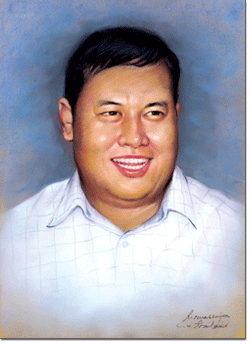 Aung Ko Win
Aung Ko Win
Aung Ko Win—prior to 1988, a school teacher and still known in some circles as “Saya Kyaung”—has risen from obscurity to become a powerful and well-connected business figure in
Aung Ko Win’s connections with Maung Aye, and the accumulation of his considerable wealth, began in the early 1990s as a purchaser for the
Since his humble beginnings in business, which included forays in agricultural business and imports—he was previously the only person to possess an import license for cement—Aung Ko Win has headed several successful enterprises, including the Myanmar Billion Group, Nilayoma Co, and
Aung Ko Win assumed control of Kanbawza Bank with substantial financial backing from businessmen in the cooking oil and gem industries. As with other Burmese tycoons, Aung Ko Win has also used his wealth to support civic and cultural development.
..........................................................................................................
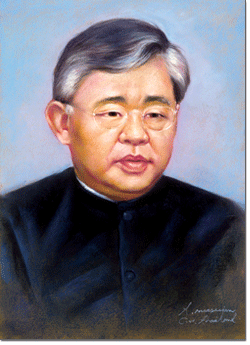 Serge Pun
Serge Pun
Born in Rangoon in 1953, Serge Pun—chairman of the multinational SPA Group and Rangoon’s Yoma Bank—left Burma for Beijing in 1965, three years after the newly minted dictator, Gen Ne Win, seized power and began expelling foreign residents.
Serge Pun spent many of his formative years within
SPA
A keen businessman with a knack for identifying lucrative new markets, Serge Pun is said to have developed the successful Pun Hlaing Golf Club after learning that
Apart from his considerable business ventures in
The chief executive officer of SPA, Martin Pun—Serge’s brother—also chairs numerous non-profit organizations such as the Business Coalition against AIDS and the Tuesday Club, an informal organization comprising foreign businessmen in
..........................................................................................................
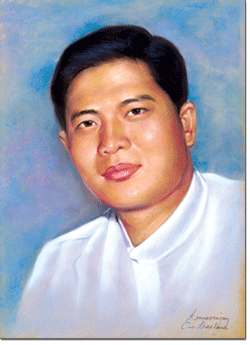 Maung Weik
Maung Weik
Another of Burma’s young business barons, Maung Weik founded the Maung Weik & Family Co, which first gained prominence a decade ago and has since become the biggest importer of steel and gilding glue—used in the building and maintenance of Burma’s many pagodas. While his company has earned much of its profits from the development and construction sectors, Maung Weik also speculated heavily in the futures markets (beans and pulses) for several years until profits flattened out in 2005, and two years earlier began exporting marine products.
Maung Weik stirred up controversy in 2004 with his purchase of 44 acres of
Other difficulties have posed problems for Maung Weik, whose company has in recent years earned a reputation for shoddy construction materials and poor service. Such criticism and speculation about Maung Weik’s connections with Khin Nyunt, say fellow businessmen in
Perhaps Maung Weik sells himself short. He has considerable connections within
..........................................................................................................
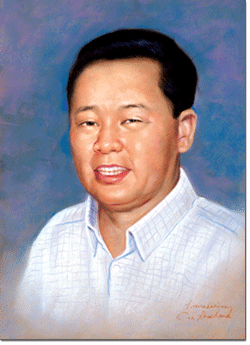 Htay Myint
Htay Myint
Chairman of the Yuzana Co, established in 1994, Htay Myint hails from southern
The CVs of Burmese tycoons would not be complete without memberships in numerous civic and professional organizations. Htay Myint’s is certainly no different. He serves as president of the Construction Owners Association, the Fishing Vessel Owners Association, and the Myanmar Projects Association, among others.
Among the more notable investments of Yuzana are Rangoon’s Yuzana Supermarket—one of the biggest shopping complexes in Burma—and the three-star 198-room Yuzana Hotel, also in Rangoon. Like many of his colleagues in the tycoon community, Htay Myint has been linked with former prime minister Khin Nyunt, who is believed to own a significant number of shares in Yuzana.
..........................................................................................................
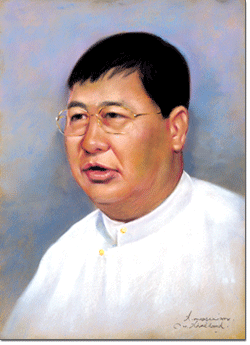 Khin Shwe
Khin Shwe
One of
His considerable business holdings include Zaykabar Co (he is president of the company), 3,000 acres of Mingalardon Garden City, the 1,000-acre Yangon Industrial Park, the Royal Mingalardon Golf and Country Club, Zaykabar Engineering & Construction Co, Mya Yeik Nyo Royal Hotel Group (the hotel was a favorite haunt of former prime minister Khin Nyunt and his cronies), Karaweik Palace, Kandawgyi Nature Park and Recreation Zone, and Myanmar Sampeorna Tobacco Co. His tobacco interests led him to establish
Zaykabar’s 75 projects undertaken since 1978 (46 of them government contracts) include a drilling site and access roads for Myanmar Shell BV (Netherlands) and Croft Exploration (UK), Sedona Hotel, YKK Golden Hill Tower and Marina Residential Apartments.
One of the company’s most recent projects is
Following tightened sanctions by the
Politics are also on businessman Khin Shwe’s agenda, and in 1997, he reportedly hired an American company, Bain and Associates Inc., of Alexandria, to promote a favorable international image of Burma—an endeavour that must have failed miserably.
He has publicly backed the junta’s seven-point “road map” to democracy, participates personally in National Convention sessions and toes the government line on democratic opposition—criticizing Nobel Peace Prize recipient Aung San Suu Kyi, accusing her of creating divisions among the Burmese people by acting out of self-interest. Nevertheless, when prime minister Khin Nyunt was toppled last October it was rumored that Khin Shwe was being investigated because of his close connection with the ousted leader. But he survived the purges and appears to be on good terms with the current leadership, perhaps because his daughter is married to the son of Gen Thura Shwe Mann, number three man in the ruling council.
Donating to worthy causes, usually government ones, is no problem for the wealthy entrepreneur and he makes no secret of his generosity, claiming that he and his family have so far given away more than 2 billion kyat (US $2 million) for the renovation of pagodas, education, sports facilities and regime-organized social activities.
The money was well spent though, for (besides lucrative government contracts) it won him one of Burma’s highest honors, the 1998 Aggamaha Sirisudhamma Manijhotadhara award, and the Excellent Performance in Social Fields (first class) award in 1995.
In 1998, Khin Shwe accepted an apparently bogus honorary doctorate in business administration from the
In
..........................................................................................................
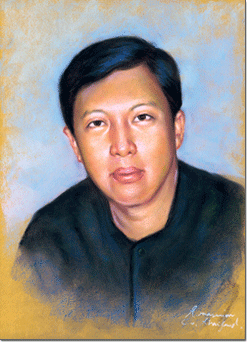 Zaw Zaw
Zaw Zaw
The managing director of Max Myanmar Co, Zaw Zaw is one of
Zaw Zaw founded Max Myanmar in 1995, before which he lived in
..........................................................................................................
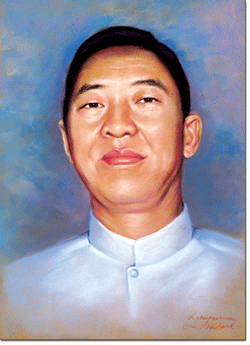 Eike Htun
Eike Htun
Eike Htun—managing director of Olympic Construction Co and deputy chairman of Asia Wealth Bank—arrived on
He subsequently rose to prominence, though not without hardships and despite persistent rumors of illicit connections with shadowy Taiwanese business figures and the international drug trade.
Eike Htun’s Olympic Construction Co invests heavily in residential property and hotel development in
Established in 1994, Asia Wealth is the largest bank in
A trip to Chiang Mai for a banking conference in 2000 garnered further unwanted attention for Eike Htun, as Bangkok-based newspapers rekindled allegations of his involvement in the drug trade. Sources in Rangoon told The Irrawaddy that Eike Htun and Win Maung—chairman of Asia Wealth Bank—are the puppets of powerful Chinese businessmen outside Burma, and that both men are in reality not the “big fish” they appear to be.
..........................................................................................................
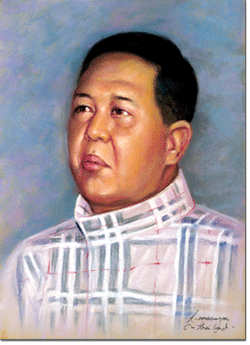 Chit Khaing
Chit Khaing
Chit Khaing, founder and managing director of Eden Group Co, began his steady climb to the top of
Among its many lucrative projects are three universities built for the Burmese government:
The extent of Chit Khaing’s earnings is not known, but he is said to have purchased earlier this year the luxurious Marina Residence condominium complex—home to many in Rangoon’s affluent expatriate community—for US $4.8 million. A significant player in the lucrative cross-border trade with
Chit Khaing’s reputed attempts to forge close ties with
|
While not currently ranked among - Kyaw Win, founder and chairman of Shwe Thanlwin Co - Nay Win Tun, managing director of Ruby Dragon Jade and Gems Co - Michael Moe Myint, managing director of Myint & Associates Group Co - Aung Thet Mann, managing director of Ayer Shwe Wah Co |